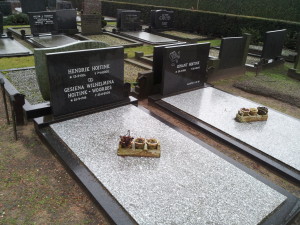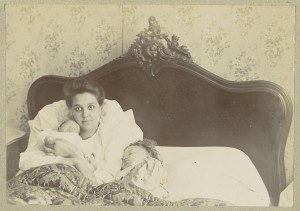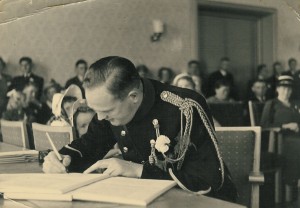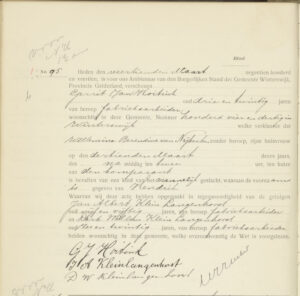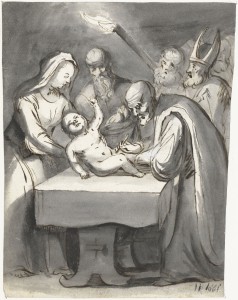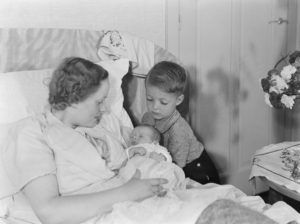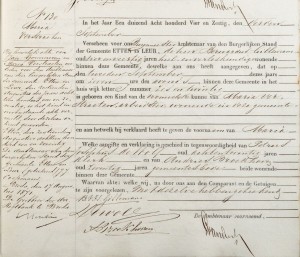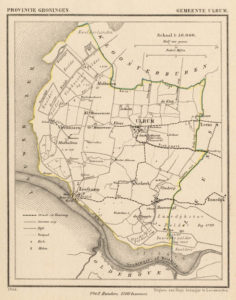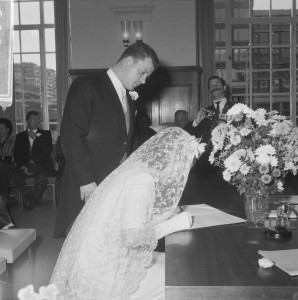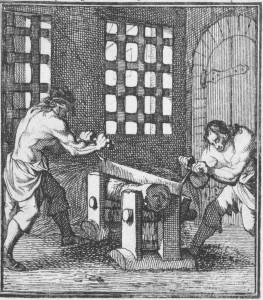In the Netherlands, vital records do not immediately become public but remain closed for a certain period: Birth records: 100 years Marriage records: 75 years Death records: 50 years. The records become public on 1 January of the year following the embargo period. As I described in a previous post, it may be possible to obtain copies of non-pubic records with permission of the person involved or with proof of their death. In this post, I will describe some alternative sources for … [Read more...]
Quick tip – Get the birth records of all children
When you are researching a family during the time of the civil registration (after 1811 in most parts of the Netherlands), make sure to gather the birth records of all the children. They are usually easy to find since most of them have been indexed. Some things you can learn when you have the birth records of all the children: It will give you the family composition. I find it interesting to see what place a child had in its family. Was he the oldest son? He may have followed in his … [Read more...]
Level 2 Checklist – Vital Statistics
Last month I issued my Level-Up Challenge, challenging you to assess how complete your research is. Level 2 is vital statistics only. In this blog post, I will explain which sources I feel I need to have found or searched for in order to say I have reached level 2. For each vital event, I want to have found at least one of the sources indicated here so I know where and when a person was born, married, and died. Date and place of birth Birth record (civil registration) I want to find … [Read more...]
Quick tip – Check Both Archives For Civil Registration Records
When civil registration records are created, two original copies are made. They are duplicate originals and both have the same legal standing. One is kept at the local level, and can now often be found in municipal or regional archives. The other is kept at the provincial level, originally in court houses but now in the archives in the provincial capital. It is worthwhile to check both archives for the records: One archive may have indexed the records while the other did not One … [Read more...]
Dutch term – Besnijdenis
Besnijdenis is the Dutch word for circumcision. In the Netherlands, circumcision was traditionally performed on Jewish boys only. For the period before the introduction of the civil registration in 1811, besnijdenisregisters [circumcision records] are an important source of birth information about male Jewish ancestors. They can often be found among the church records. Read about other resources for Jewish research. … [Read more...]
5 Ways to Find Out When Your Ancestor Was Born
How do you find out when your ancestor from the Netherlands was born? Here are five different ways. … [Read more...]
Quick tip – Don’t confuse the date of the record and the event
Births and deaths are created within several days of the event. The first date that you will find in the birth record or death record is the record date. Further down in the record, you will find the actual birth or death date, which could have been up to five days earlier. Indexes sometimes only have the record date, so make sure to always check the original record. Marriages were recorded on the day of the marriage, so there is no difference between the date of the event and the record … [Read more...]
Ask Yvette: Untangling two same-named women
My distant cousin, Fred Geurkink, asked me the following question [edited for brevity]: My grandma Gigi, (Marion Peterson), wrote down in her recollections about my great great grandma Grietje Koning. Said she was born on 30 Aug 1834, married my gg grandpa Jan Pieters Stelma on 23 Jun 1856, etc etc. On Ancestry, I received "hints" about said Grietje Koning from other members, who also married Jan Pieters Stelma, but her birthday was different: July 29 1834. Could my grandma be wrong, or are … [Read more...]
How Civil Registration Records were Created
If you are researching nineteenth and twentieth century Dutch ancestors, the civil registration records of births, marriages and deaths are among the first sources you should consult. Understanding how these records were created will help you assess their reliability. Birth records When the civil registration was introduced nation-wide in 1811, the law required that baby be presented at town hall, to make sure that a birth actually took place. Since this could be dangerous to the child, … [Read more...]
Quick tip – Always check the original record
My client wanted me to find interesting stories about her ancestors. Normally, that would have me scouring newspapers and court records, but only after I find the basic information about birth, marriages and death. The civil registration records are not the first place you would think to look for interesting stories, but sometimes they will give you the first hint. I found the date and place of birth of one of her ancestors in the extract of his birth record in the marriage supplements. A … [Read more...]
